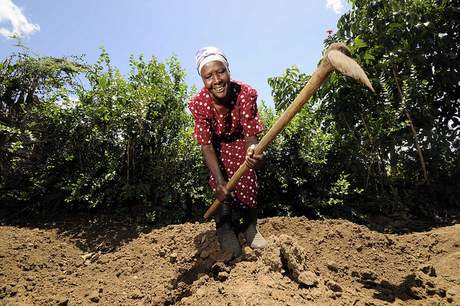 The African Orphan Crops Consortium has initiated plans to research and develop over 100 more nutritious African crop species which were formerly neglected in a move aimed at improving the nutrition of African farm families, especially children. The list of the 100 species, developed by African scientists and their colleagues elsewhere, is being released so that researchers around the world can contact the consortium with suggestions for research needs regarding the selected species. The crop list, available at the consortium’s website includes African eggplant, amaranth spider plant among others.
The African Orphan Crops Consortium has initiated plans to research and develop over 100 more nutritious African crop species which were formerly neglected in a move aimed at improving the nutrition of African farm families, especially children. The list of the 100 species, developed by African scientists and their colleagues elsewhere, is being released so that researchers around the world can contact the consortium with suggestions for research needs regarding the selected species. The crop list, available at the consortium’s website includes African eggplant, amaranth spider plant among others.
Through their partner funding, the consortium will undertake laboratory tests to determine the complete DNA sequence for each of the crops listed. The first orphan crop to be studied will be baobab, which can be used as a dried fruit powder for consumer products. Baobab is called "the wonder tree" in Africa because its fruit has antiviral properties and other health benefits, ten times the antioxidant level of oranges, twice the amount of calcium as spinach, three times the vitamin C of oranges and four times more potassium than bananas.
The consortium’s goal is to use the latest scientific equipment and techniques to guide the development of more robust produce with higher nutritional content. "Orphan crops" are African food crops and tree species that have been neglected by researchers and industry because they are not economically important on the global market. Mars Inc. previously led a similar collaboration that sequenced, assembled and annotated the cacao (cocoa) genome and made these data publically available on the Internet to all researchers in 2010.
In December 2013 the consortium opened the African Plant Breeding Academy in Nairobi, Kenya, to help reduce hunger and malnutrition among the 600 million Africans who live in rural areas, and to boost Africa’s food supply. The academy will train 250 plant breeders and technicians in genomics and marker-assisted selection for crop improvement over a five-year period. The resulting improved planting materials will then be offered to smallholder farmers throughout Africa.
The academy provides scientists and technicians with a dedicated place to sequence, assemble and annotate the genomes to help develop food crops with higher nutritional value and which can better withstand climate changes, pests and disease. The data derived will be made publically available with the endorsement of the African Union through a process managed by the Public Intellectual Property Resource for Agriculture. The consortium invites communities focusing on the development of orphan crops to collaborate with the consortium on improving the productivity and nutrition of these crops.
















Comments powered by CComment